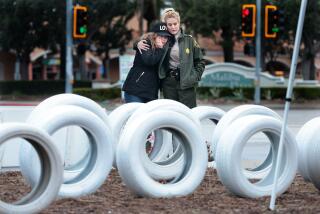1995 Brings a Slew of New Rules for Drivers
Early in this century, it was illegal to ride a bicycle or drive a car in Los Angeles without having a “bell, gong or whistle” to warn other vehicles, pedestrians and “horses and other animals” of possible danger.
It also was illegal to drive faster than 8 m.p.h., grab hold of a streetcar while wearing roller skates or haul manure down a fashionable stretch of Wilshire Boulevard.
Those laws--drafted in an era when automobiles were forced to navigate among horse-drawn carriages and street cars--have long since been replaced by traffic regulations written in response to the changing times and transportation.
Laws taking effect this year deal with drive-by shootings, carjackings and unlicensed drivers. (Unlicensed drivers were not an issue in the earliest part of the century because licenses were not required until 1916.)
In all, the new traffic laws fill a 79-page book.
They range from a highly publicized law--which took effect at 12:01 a.m. Sunday--permanently confiscating the cars of drivers caught a second time driving without a license, to an obscure law providing for license plates reading “foreign organization.”
The new plates are for “officers or designated employees of foreign organizations recognized by the United States pursuant to the Taiwan Relations Act.” Since the United States officially recognizes the People’s Republic of China, Taiwanese officials cannot get diplomatic plates--the same plates that allow foreign dignitaries to ignore parking tickets. The new plates, however, will not exempt their owners from any laws.
The list of nonprofit groups using special license plates as a fund-raising gimmick also was expanded to include the California Coastal Commission’s beach clean-up program, the American Heritage Rodeo Foundation and the Monterey Bay National Marine Sanctuary. But unlike the Taiwanese, these groups must line up 5,000 paying customers before their plates can go into production at Folsom State Prison. They may be the last. A state task force is studying whether to end the program because the large number of license plate varieties has caused problems for law enforcement.
The bill cracking down on unlicensed drivers has been dubbed the Safe Streets Act of 1994 by its author, Assemblyman Richard Katz (D-Sylmar). Unlicensed drivers with a prior conviction for driving without a license or on a suspended or revoked license within the past five years will forfeit their cars. The vehicles will then be sold, with proceeds going to pay off the car loan, tow-truck company and impound lot.
The law was prompted by DMV estimates that nearly 1.7 million Californians--about 8% of the state’s drivers--are driving with suspended or revoked licenses or without ever having been licensed. Katz said unlicensed drivers are involved in a disproportionate share of fatal accidents.
A bill by Sen. Quentin L. Kopp (I-San Francisco) makes it a misdemeanor for a car owner to knowingly permit an unlicensed driver to take the wheel of his or her car. The bill also allows felony prosecution, subject to a year’s imprisonment, of anyone convicted of driving without a license within five years of being convicted of the same offense. And judges will no longer be allowed to waive a mandatory 10-day jail sentence for repeat unlicensed drivers who already lost their licenses for refusing to take a drunk-driving test.
Another new law repeals a decades-old prohibition against radiator-cap ornaments that protrude through the grill of a car. CHP officials said the law was passed because the ornaments--like winged horses--posed a threat of spearing people in an accident. But the prohibition was made unnecessary because of another law prohibiting hood ornaments from extending over car bumpers.
Other new transportation-related laws will:
* Prohibit tow truck operators from receiving kickbacks from auto repair shops.
* Permit judges to suspend for a year the driving privileges of a student who is truant from school for three days in one year.
* Continue a $1 surcharge and establish an additional $1 tax on vehicle registrations to fund about 460 more CHP officers.
* Allow police to confiscate the cars of criminal gang members carrying illegal firearms in their vehicles. The legislation also permits judges to suspend the driving privileges for five years of a minor convicted of a crime in which a gun was used.
* Require the DMV to suspend the licenses of truck and other commercial drivers who are 30 days behind in court-ordered child support payments.
* Allow a car alarm to be activated when the vehicle is moving. The legislation was billed as an additional defense to carjackings.
* Clarify the requirement that child safety seats must be used by children under 4 years of age or weighing less than 40 pounds. The bill also increases the fine for seat-belt violations for children ages 4 to 16 to $50 for the first offense and $100 for each subsequent offense.
* Add drive-by shootings to the list of second-degree murder convictions so that sentence reductions for good behavior can be limited to one-third instead of one-half the sentence.
* Empower authorities to confiscate tools used by car thieves. Legislators passed the law after learning of a San Diego case where a car thief was entitled to get back his “chop shop” tools, even after he was convicted.
* Create a new statewide automobile anti-theft program financed by requiring car insurance companies to pay a 20-cent annual fee for each vehicle they insure. * Permanently revoke the driver’s license of anyone convicted of using a car as a deadly weapon.
More to Read
Sign up for Essential California
The most important California stories and recommendations in your inbox every morning.
You may occasionally receive promotional content from the Los Angeles Times.










